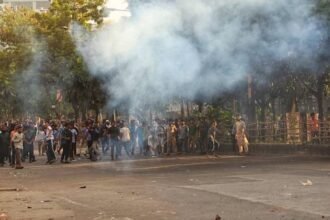With a record 38 candidates in the running, the first election since 2022’s historic protests signals a shift in the nation’s political landscape.
How has Protest transformed the Nation?
COLOMBO, Sri Lanka — The mood is much different from the last presidential contest as Sri Lankans prepare to vote on September 21. The first vote since the significant demonstrations of 2022, also called the “aragalaya,” or struggle, ousted President Gotabaya Rajapaksa during the worst economic crisis the Nation has seen in decades.
Thirty-three-year-old banker Samadhi Paramitha Brahmananayake remembers months of camping among thousands of others in Colombo’s protest camps. She muses on the change as she views the verdant field that suddenly replaces the rows of tents. “I thought I would spend my whole life here, fighting a corrupt government – but the younger generation did something,” she adds. “I feel we’re now more powerful, more vibrant.”
Economic misery drove the demonstrations; inflation reached 70%, and basics, including food, cooking gas, and medication in limited supply, were in demand. The unrest resulted in the departure of Rajapaksa, who was succeeded six times by former Prime Minister Ranil Wickremesinghe. Still, the present leadership reminds many of the previous generation’s shortcomings.
Is the Current Leadership Too Divisive to Win?
Now a running independent candidate, Wickremesinghe has an uphill fight. Critics charged him with protecting the Rajapaksa family, a political dynasty blamed for the financial misconduct sparking the crisis. “We need a president who the people elect,” says 28-year-old Mithun Jayawardana, who joined the 2022 demonstrations while lacking a job and living without basic amenities. The people did not choose the present president.
Wickremesinghe has a significant handicap from his relationship with the Rajapaksas. For many, the family—which controlled Sri Lankan politics for decades—has come to represent corruption and economic misrule. Among 13 people blamed for the financial crisis, a court identified Gotabaya Rajapaksa and his brother Mahinda, another former president. The family still has a lot of power in several spheres, nonetheless.
Can the Rajapaksas Regain Trust and Influence?
Among the 38 contenders running for the president is Namal Rajapaksa, the son of Mahinda. He is still rebellious against the charges that his family has brought the Nation into financial disaster. Namal said at a gathering in Minuwangoda, a town outside Colombo, “We know our hands are clean; we know we have not done anything wrong to the people of this country.” He gathered hundreds of followers. His campaign has revolved around the legacy of his father, who some still see as a hero for ending the civil war in his Nation decisively over Tamil Tiger insurgents.
The younger Rajapaksa, however, must persuade voters who blame his family for the economic disaster that left Sri Lanka precariously near bankruptcy. Jayawardana accused Gotabaya Rajapaksa and his government of the catastrophe. “He left the Nation shortly before we attacked his house. We must turn in another direction.
Who Are the Candidates Promising Change?
Among the frontrunners are Anura Kumara Dissanayake and Sajith Premadasa, both sharply deviating from the traditional political guard. Leader of the major opposition party Samagi Jana Balawegaya (SJB), Premadasa barely lost to Gotabaya Rajapaksa in 2019. He promises to raise taxes on the rich and better the lot of the underprivileged. Premadasa declared earlier this week, “I will make sure the poor see better days and the rich pay their share.”
Drawing hundreds to his demonstrations, Dissanayake, standing for the Marxist National People’s Party alliance, has been unexpectedly competitive. “Yes, 100% sure, okay,” he answered boldly when asked whether he could prevail. Acting as a working-class voice, he has pledged broad anti-corruption policies and sound government. People these days are debating politics. Brahmananayake notes the increasing political participation following the demonstrations and answers questions they have.
What Are Voters' Biggest Concerns?
Still, the biggest concern for many Sri Lankans is the state of the economy. Years of poor management and the epidemic’s aggravation of the Nation’s $92 billion debt load have resulted in extreme austerity policies. Rising taxes and exorbitant pricing are affecting 35-year-old mother Rangika Munasinghe. “Taxes on food and goods are high; salaries are being lowered.” The meals for children, milk powder, and everything else are more costly. In a packed Colombo market, she adds, ” Taxes are so high; we cannot manage it.”
Likewise, the septuagenarian Mohamed Rajabdeen does two jobs to pay for living. “People should be able to live in peace and cooperation; university students should find employment; we should obtain decent pay. He remarks that we want our government to satisfy all of that, reflecting many people’s worries.
Is Sri Lanka Entering a New Era of Political Engagement?
The demonstration movement has permanently changed Sri Lankan society. 28-year-old political activist Buwanaka Perera notes that people are bolder in challenging the state or facing what’s wrong. “It’s not just the state; it’s trickled down to everyday things – it can be in your household, and it can be in your streets.”
The legacy of the aragalaya is one of empowerment and optimism for Brahmananayake and many others who turned out in 2022. Climate and political activist Melani Gunathilaka says, “People took charge; people exercised their democratic rights to do what’s right for the country for the first time.” “There has been a great change in society but not in the political and economic cultures.”
The question yet stands as Sri Lanka approaches the polls: can this newly acquired political consciousness lead to a new era of government? The country’s eyes are on the result, yearning for a leader who can negotiate the choppy seas of economic recovery and satisfy the expectations of a more involved population.
Global Capability Centres: India’s Rise from Back-Office to Global Powerhouse








